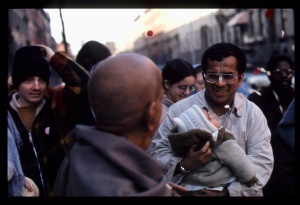CC Madhya 13.171 (1975): Difference between revisions
(Vanibot #0027: CCMirror - Mirror CC's 1996 edition to form a basis for 1975) |
(Vanibot #0020: VersionCompareLinker - added a link to the Version Compare feature) |
||
| Line 2: | Line 2: | ||
<div style="float:left">'''[[Sri Caitanya-caritamrta (1975)|Śrī Caitanya-caritāmṛta (1975)]] - [[CC Madhya (1975)|Madhya-līlā]] - [[CC Madhya 13 (1975)|Chapter 13: The Ecstatic Dancing of the Lord at Ratha-yātrā]]'''</div> | <div style="float:left">'''[[Sri Caitanya-caritamrta (1975)|Śrī Caitanya-caritāmṛta (1975)]] - [[CC Madhya (1975)|Madhya-līlā]] - [[CC Madhya 13 (1975)|Chapter 13: The Ecstatic Dancing of the Lord at Ratha-yātrā]]'''</div> | ||
<div style="float:right">[[File:Go-previous.png|link=CC Madhya 13.170 (1975)|Madhya-līlā 13.170]] '''[[CC Madhya 13.170 (1975)|Madhya-līlā 13.170]] - [[CC Madhya 13.172 (1975)|Madhya-līlā 13.172]]''' [[File:Go-next.png|link=CC Madhya 13.172 (1975)|Madhya-līlā 13.172]]</div> | <div style="float:right">[[File:Go-previous.png|link=CC Madhya 13.170 (1975)|Madhya-līlā 13.170]] '''[[CC Madhya 13.170 (1975)|Madhya-līlā 13.170]] - [[CC Madhya 13.172 (1975)|Madhya-līlā 13.172]]''' [[File:Go-next.png|link=CC Madhya 13.172 (1975)|Madhya-līlā 13.172]]</div> | ||
{{CompareVersions|CC|Madhya 13.171|CC 1975|CC 1996}} | |||
{{RandomImage}} | {{RandomImage}} | ||
==== TEXT 171 ==== | ==== TEXT 171 ==== | ||
| Line 18: | Line 17: | ||
<div class="synonyms"> | <div class="synonyms"> | ||
ānanda-unmāde—the madness of transcendental bliss; uṭhāya—causes to arise; bhāvera—of | ānanda-unmāde—the madness of transcendental bliss; uṭhāya—causes to arise; bhāvera—of emotion; taraṅga—waves; nānā—various; bhāva—emotions; sainye—among soldiers; upajila—there appeared; yuddha-raṅga—fighting. | ||
</div> | </div> | ||
Latest revision as of 07:40, 27 January 2020
Śrī Caitanya-caritāmṛta (1975) - Madhya-līlā - Chapter 13: The Ecstatic Dancing of the Lord at Ratha-yātrā

His Divine Grace
A.C. Bhaktivedanta Swami Prabhupada
A.C. Bhaktivedanta Swami Prabhupada
TEXT 171
- ānandonmāde uṭhāya bhāvera taraṅga
- nānā-bhāva-sainye upajila yuddha-raṅga
SYNONYMS
ānanda-unmāde—the madness of transcendental bliss; uṭhāya—causes to arise; bhāvera—of emotion; taraṅga—waves; nānā—various; bhāva—emotions; sainye—among soldiers; upajila—there appeared; yuddha-raṅga—fighting.
TRANSLATION
The madness of transcendental bliss created waves of various emotions. The emotions appeared like opposing soldiers staging a fight.